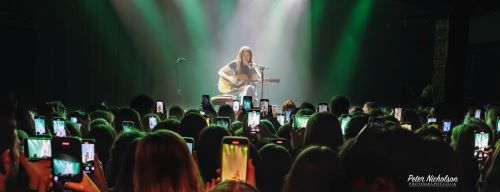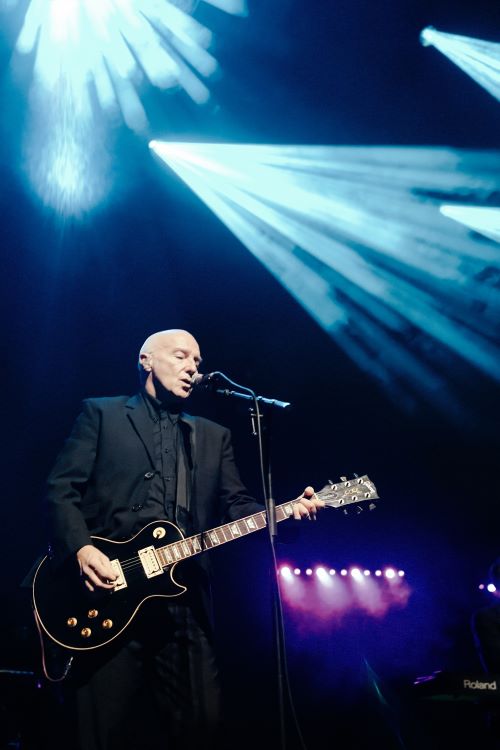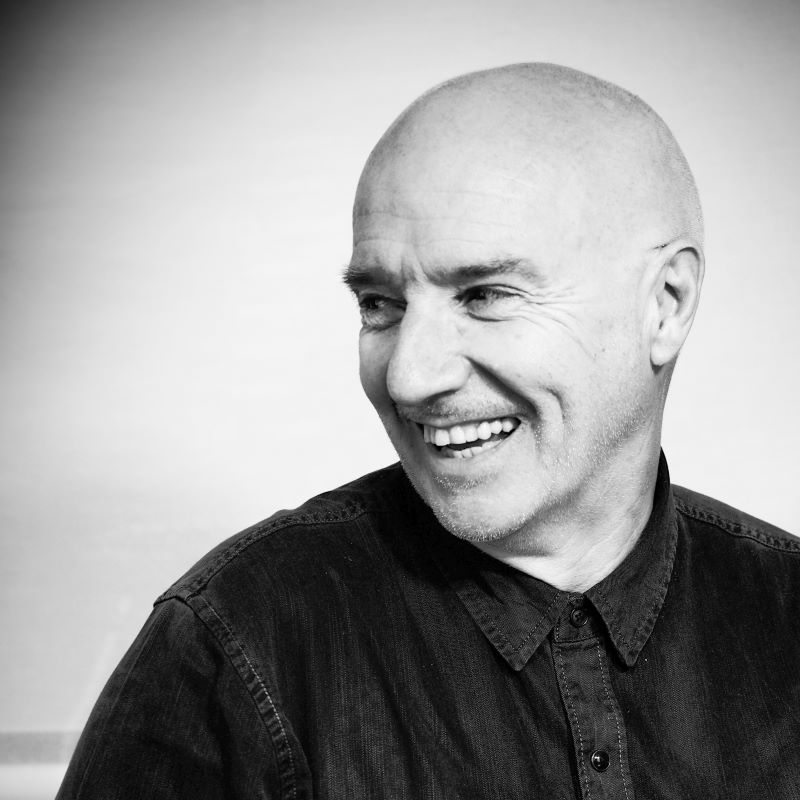by Peter Nicholson.
There are a number of household names that spring to mind when the music chat turns to the 1980s, but there’s always one event that is remembered over all others… Live Aid. The two hugely ambitious concerts, separated by the Atlantic Ocean were arguably the first time that musicians came together and used music to help relieve the suffering of so many people.
The famine in Ethiopia was the spark that set two men on the road to organising this musical milestone. One of those men was Bob Geldof, and the other was Midge Ure.
Following the success of his last live tour in 2019, Midge and his band are back on the road and playing the best songs from two of his iconic albums: “Rage in Eden” & “Quartet”, bringing him to Southampton’s Engine Rooms on May 3 on his Voice and Visions tour.
It was a personal thrill for me when I met with Midge to discuss the tour, and to chat about his enviable musical history.
I mentioned to Midge that in a strange way, I, along with countless other people who remember the 80s so well, felt as though we knew him. I asked if he understood how that felt for people who know his music so well:
“I think I understand that more now, simply because anyone in music is probably only there because they are a fan of someone else. It’s also odd for me because I came to know so many of the people I idolised. I remember once when I was standing at the reception of a recording studio in Los Angeles, and I felt a pair of hands come round and cover my eyes. I turned round and it was David Bowie! It was so surreal. Nowadays I see people who look at me and think that I look like someone trying to look like Midge Ure [laughing]. The fandom never disappears.”
I apologise if you get tired of talking about it, but I really have to ask about Band Aid and Live Aid. Does it still fill you with pride?
“It feels strange because it’s so far in the past, and it was all such a blur at the time, although I’m still one of the trustees of the charity. There’s certainly nothing not to be proud of. It was done with the best intentions and for all the right reasons, but nobody saw what it was going to become. It was truly a social event that bounced other people into the position to be able to use music to help them with whatever cause they were pioneering and championing.
What do you see as it’s biggest legacy?
“The legacy is mainly the fact there are people alive today who wouldn’t have been, and the fact that they’re still talking about it today. Teaching kids in schools why they were singing that song at Christmas. That song has somehow integrated it’s way in with classics like “White Christmas”.”
Is there anything that really sticks in your mind from the day?
“The one thing that does is that after the show, when everyone was on their way to all the after show parties, I was on my way back to my house because I’d flown in from the States that day and was exhausted. As I drove through London, I could see people being invited into neighbours’ homes and gardens. I’d never seen that in London before. Never. Inviting strangers into their homes to see the second part of the show from America. It was amazing. Like Scotland at Hogmanay. Like London had found its heart.”
It was a different time, no social media either!
“[Laughs] I know, people would actually watch a concert rather than just filming it on your phone!”

[At this point I showed Midge a photograph I recently took at a Gracie Abrams gig, showing a sea of mobile phones filming and photographing the stage]*
“Absolutely, there’s something seriously wrong with that, it’s like Orwell’ 1984, but in the future. Big Brother, all very odd [laughs].”
Music has changed so much since you started out. What are your thoughts on streaming music?
“It has changed. From the 90s an entire generation has grown up thinking that music’s free. They see it as there, so why should they have to pay for it. They don’t understand the cost of making music. Whether you’re doing it yourself or even with a record label, it costs a lot of money to do. Streaming payments are ludicrous. 0.006 cents per stream, or whatever. Artists can get millions of streams and get a check that might buy a loaf of bread.”
It seems that with the ever-growing numbers of artists releasing music, it seems harder and harder to get noticed.
“That’s true. You’re in a line, with your needle, waiting with millions of other people with their needles, queuing up to throw it on a bigger pile of needles. It’s finding the way of pointing people to what you’re making. I wouldn’t want to be starting out now, that’s for sure [smiles].”
 Do you still enjoy the live performance side of the business?
Do you still enjoy the live performance side of the business?
“Oh God yes. You couldn’t do it if you didn’t. With this tour I’m focusing on two albums. I did plan to play them both in their entirety, but then went back and listened to them and realised that some of it just wouldn’t resonate now. I didn’t want to stand on stage and pretend that it does, audiences aren’t stupid, they’ll see it in your eyes that you don’t mean it. So, I cherry picked the ones I knew would resonate.”
Are you going to be playing them in their original style?
“Definitely. I see artists play versions of songs that audiences don’t recognise until they’re almost finished. No! Why? [laughs] It’s like taking the Mona Lisa and putting a moustache on her, it just doesn’t work. [Laughs].”
Finally, as a big fan of Thin Lizzy, I have to ask about that part of your career when you became a Thin Lizzy’s guitarist.
“[Laughing] My stint with Lizzy! I knew Phil Lynott when we used to hang out in London while I was with The Rich Kids. Then, soon after I’d just joined Ultravox, Phil was in America touring with Journey, and he phoned me and said that Gary Moore wasn’t in the band anymore and can you come out and play guitar. This was literally the next day when he wanted me there. So, I finished in the studio, got home, grabbed a bunch of cassettes, my ghetto blaster and some headphone, this was 1979, and listened to all the songs on the plane. They flew me on Concorde! I had no time to learn anything, so my first night in America, my very first night, was spent in a hotel room with Scott Gorham, learning all the guitar parts, and the next night we’re on stage in front of 30,000 people! That is schoolboy dreams coming true! [Laughs].”
It was such a trill to speak with someone of such huge stature within the music industry. To finally be able to discuss the musical milestone that Live Aid was, with one of its architects, was an absolute joy. Midge’s date in Southampton is already sold out. If you’ve managed to bag a ticket to the show on the 3rd May at the Engine Rooms, I’m certain that you’ll be in for a nostalgic treat.
- For a full list of dates of Midge Ure’s Voice and Visions tour, click here: midgeure.seetickets.com/tour/midge-ure
- In Common is not for profit. We rely on donations from readers to keep the site running. Could you help to support us for as little as 25p a week? Please help us to carry on offering independent grass roots media. Visit: https://www.patreon.com/incommonsoton

